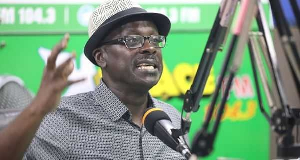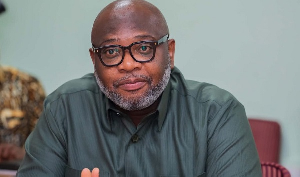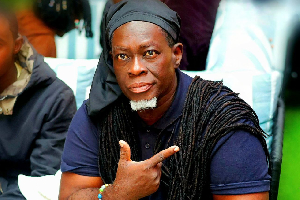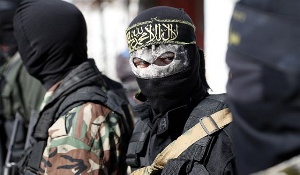Kwame Okoampa-Ahoofe Quotes:
“Now talking about moral decay on the postcolonial political front, for example, you had a 49-year-old Prime Minister Nkrumah dating a 19-year-old Achimota School girl. This kind of "Sugar-Daddyism," properly speaking pedophilia…” (Kwame Okoampa-Ahoofe, Jr., “Kwame Nkrumah And The Culture of Disrespect,” Ghanaweb, December 11, 2014).
“In sum, for those of us who hold our racial-Africanity in high stead, or regard, or with inviolable dignity, nothing could have been more insulting than President Nkrumah’s December 31, 1957 marriage to 25-year-old Ms. Helena Ritz Fathia, a woman who was barely half the age of the newly-elected Ghanaian Prime Minister. In America, where he had undertaken his advanced collegiate studies, under the right circumstances, Nkrumah could either have been promptly charged with statutory rape or even incest…Needless to say, prior to his 1957 marriage to Ms. Fathia…then-Prime Minister Nkrumah was widely known to have fathered quite a number of children by Ghanaian women” (“Helena-Ritz Fathia Nkrumah Was A Victim Of Nkrumahism,” Ghanaweb, June 10, 2007).
THE EXAMPLE OF J.B. DANQUAH’S FATHER STATUTORY RAPE
There has been a tendency on the part of some professional haters of Kwame Nkrumah to brand him as a pedophile. And yet, why anyone will go this far to try to tarnish the image of one of humanity’s greatest and visionary statesmen, for lack of verifiable evidence, remains a mystery. Well, for those who have claimed Nkrumah, 47, was a pedophile because he married Fathia, 26, a mature young woman—which is not substantially different from Okoampa-Ahoofe, Jr.’s arguments—here are the facts about the ages of Danquah’s parents when they married and gave birth to him (Danquah)):
J. B. Danquah’s father, Yao Boakye, aged 60, married J. B. Danquah’s mother, Lydia Okom Korantemaa, aged 15, and at age 16 gave birth to Kwame Kyeretwie (later J.B. Danquah) on December 21, 1895 (See “Danquah: An Immortal of Ghana, Biographical Sketch, Compiled by Danquah’s Funeral Committee, 1968”). What is this, if not a classic case of a double statutory rape of an underage?
As well, J.B. Danquah and Mabel Dove Danquah (1905-1984), his first wife, had a child called Vladimir, a boy who happened to be their only child. Besides, Danquah had other children with other women in Ghana. Probably not surprisingly, this may explain why some writers have suggested that Danquah fathered a large number of children both acknowledged and unacknowledged. Lastly, but not least, if there is one person with a spitting image of Danquah, it is acknowledged, is a daughter she had with a Ningo woman.
At any rate, if in fact, Danquah’s mother, born in 1879, gave birth to him (Danquah) on December 21, 1895 when she was 16, and his father was 61, then this is, beyond any reasonable doubt, a classic case of a DOUBLE STATUTORY RAPE of an underage (15 year-old) girl. This is undeniably the case if we go by the misplaced charge levelled against Nkrumah that he was a pedophile. If this was the case then Danquah was also a pedophile. Yet those who label Nkrumah in such strong language tend to avoid the parallel context in the particular case of Danquah’s father. Even so there is a little bit more to this family story—which we briefly explore in the next few paragraphs.
Oddly enough, we could still carry the argument a step further. In mathematical parlance, rounding off the ages at which Mabel and Mabel got married to the nearest tenth, 30 in each case, one then says Fathia and Mabel married their men—Nkrumah and Danquah—at the same age! What does this mean in layman’s terms? It means the ages at which Mabel and Danquah married are approximately numerically identical. Both young women were therefore mature at the time of marriage. It also means if Nkrumah was a pedophile as Okoampa-Ahoofe put it then Danquah was a pedophile too. The reverse equally holds true. Okoampa-Ahoofe does not see this in-your-face connection.
Of course, on that score we shall say in conclusion that Okoampa-Ahoofe’s statement that “On the other hand, there is absolutely no evidence pointing to the fact of 16-year-old Madam Nyaniba’s having been legitimately betrothed to the largely unknown Nkroful-resident Liberian goldsmith who put her in the family way…” is a shameful, childish, and desperate attempt to settle the score by fabricating an entirely new urban mythology to feed his revisionist lies. But this will not wash with us and our historically conscious readers. Clearly, Okoampa-Ahoofe is blinded by and caught up in his contradictions in that, although he concedes that on the one hand that there is no evidence to support Nkrumah’s father’s “legitimate” betrothal to Madam Nyaniba, Nkrumah’s gracious mother, he on the other hand does not tell his readers that there is also no evidence to support when and the ages at which Nkrumah’s father and Madam Nyaniba “married.”
And if there is no verifiable evidence to support Nkrumah’s father’s marriage to Madam Nyaniba, where is the evidence that supports the ages at the time of their marriage? Thus making Madam Nyaniba 16 or conveniently turning Okom Korantemaa, Danquah’s mother, into Nkrumah’s mother at the time of Danquah’s parents’ marriage is the height of intellectual irresponsibility. One would certainly need Nkrumah’s father’s and mother’s confirmed dates of birth (birthdates) and confirmed marriage date to compute their respective ages at the time of marriage! Could Okoampa-Ahoofe, for instance, tell us when Nkrumah’s father was born given his admission that this man was “largely unknown”? When was Nkrumah’s mother born? One would also need to know whether or not Nkrumah’s mother became pregnant immediately following her marriage! Otherwise, one needs Nkrumah’s parents’ confirmed respective birthdates and that of Nkrumah himself, in which case subtracting his parents’ respective birthdates from his [Nkrumah’s] should yield the respective ages of his parents at which he [Nkrumah] was born.
But even that is not enough, for we also need to know how long it took Nkrumah’s mother to get pregnant immediately following his parents’ “marriage.” One major limitation to this theory are the question marks hanging over Nkrumah’s birthdate. Okoampa-Ahoofe also makes the fraudulent claim that “Nyaniba ‘Nkrumah’ was scarcely more than a couple of years older than Dr. J.B. Danquah.” He offers no evidence. However , Gamel Nkrumah has suggested that his grandmother, Nkrumah’s mother, passed away seven years after her son’s death at the age of 102, implying that Nkrumah’s mother was 102 in 1979 since he passed away in 1972. Perhaps one major problem with Gama’s article is that our sources point to October 21, 1977 as the date of Madam Nyaniba’s death, rather than 1979 (“Samia Seeks Spiritual Blessings,” Daily Guide/Modernghana, March 28, 2005).
If 1977 is correct then she passed away at 100 (readers can work with the assumption that Nkrumah’s mother was 102 in 1977). That would also mean she may have been born around 1877, thus making her 25 years Danquah’s senior. On the other hand if 1979 is correct then she may have been born around 1875, thus making her 20 years Danquah’s senior. What then do these say about Okoampa-Ahoofe’s claim that Madam Nyaniba “was scarcely more than a couple of years older than Dr. J.D. Danquah”? From these data we can also estimate Madam Nyaniba’s age when she gave birth to Nkrumah. If we assume Nkrumah’s birthdate 1909 as correct then his mother’s age at the time of his birth was 32 (1909 minus 1877). On the other hand if we assume the birthdate his mother gave him (1912) to be the correct one, then her age at the time of his birth was 35 (1912 minus 1877). This implies that Nkrumah’s mother’s age at the time of his birth may have statistically oscillated about the numbers 32 and 35.
We can then approximate these numbers to the nearest tenth (32 to 30) and (35 to 40), thus, respectively, giving us 30 and 40 as the minimum and maximum ages at which she may have given birth to Nkrumah. Therefore his mother’s age at the time of his birth could have been anywhere from 30 to 40. This theory does not take into consideration when his parents’ became sexually intimate and how long it took the father to impregnate the mother. However, taking Okoampa-Ahoofe’s fraudulent and evidenceless claim of Nyaniba being 16 at the time into consideration, we are forced to speculate that it took somewhere from 14 years (30 minus 16) to 24 years (40 minus 16) for Nkrumah’s father to successfully impregnate his mother, eventually leading to his birth. Of course, these conclusions are all speculative because the date October 21, 1977 we chose for our analysis does not from a primary source, which does not mean it could not have been correct—far from it.
It means we are making room for error and opening up for meaningful corrective criticism. We therefore dare Okoampa-Ahoofe to give us better if verifiable data, particularly data on Nkrumah’s parents’ at the time of their “marriage,” contradicting our mathematical suppositions! Otherwise we will dismiss his magical 16 figure out of hand as a product of his deeply flawed imagination. We have already pointed out how his intended contradictions call his evidenceless claim about Nkrumah’s mother being 16 at the time she supposedly got sexually intimate with Nkrumah’s father into question but, as it were, the challenge we have thrown to him offers him another chance to redeem himself with superior data. Having said that, we also want to point out that in 2007 Okoampa-Ahoofe put Fathia’s age at 25 at the time she married Nkrumah on December 31, 1957. However, on September 28, 2015 the same Okoampa-Ahoofe put Fathia’s age at 24 at the time she married Nkrumah on December 31, 1957.
What are his possible motives for this sudden change? There is no doubt in our minds that this flip-flop is convenient for him because, rounding off the number 24 to the nearest tenth gives 20—rather than our mathematical approximation of 30, which automatically makes her younger than Mabel—serves his basic purpose of illogically refuting or contradicting our arguments that rounding off Fathia’s and Mabel’s ages made them both 30 at the time they got married (Note: Nkrumah’s age at the time of marriage is approximately 48 years, 3 months, 28 days and Fathia’s approximately 25 years, 10 months, 29 days). In other words, in 8 years Okoampa-Ahoofe added 1 year to Nkrumah’s and deducted the same amount from Fathia’s (that is, from their respective ages at the time of marriage).
If our calculations are correct and follow his ideological logic as he presents them in all his articles we have mentioned in this piece, then, 64 years from now Okoampa-Ahoofe will put Fathia’s age at the time of marriage at 16, Nkrumah’s at 58 (approximated to 60 to the nearest tenth), thus achieving his equalization strategy with our take on the 60-year-old Yaw Boakye marrying the 16-year-old Okom Korantemaa. What is more, by conveniently making Nkrumah’s mother scarcely more than a couple (2) of years older than Danquah Okoampa-Ahoofe achieved his aim of pegging Nyaniba’s birthdate at 1893, two less Danquah’s birthdate (1895). Subtracting Nyaniba’s “new” birthdate (1893)—implicit in Okoampa-Ahoofe’s reasoning—from Nkrumah’s (1909) gives 16, the age at which he implied Nkrumah’s father got Nyaniba pregnant and the same age at which Danquah’s mother gave birth to him.
Anti-Nhrumahist writers like Okoampa-Ahoofe are bent on distorting the facts of history as far the legacy of Nkrumah goes.
As expected, once he [Okoampa-Ahoofe] achieved what he wanted he simply avoided mentioning Nkrumah’s alternative birthdate, 1912, which when 1893 is subtracted from gives 19. Theoretically, that puts the age at which Nkrumah’s mother may have got pregnant anywhere between 16 and 19, 16 and 19 inclusive. Yet Okoampa-Ahoofe did not offer a shred of evidence to prove that Nyaniba was indeed “scarcely a couple of years” older Danquah! He also did not give evidence of Nkrumah’s father’s age at the time he may have successfully impregnated Nyaniba with Nkrumah or of Nkrumah’s father’s birthdate to help us infer the age at the time of Nkrumah’s birth. The word “scarcely” therefore amounts to nothing without a verifiable evidence of chronology—birthdates, etc. “Scarcely a couple of years” without supporting numbers is not empirical evidence. More importantly, though, Nkrumah’s other birthdate 1912 made his mother 18 at the time of her pregnancy, unlike Danquah’s mother’s 15.
Again Okoampa-Ahoofe’s arguments fall apart because Danquah was either 14 years (1909 minus 1895) or 17 years (1912 minus 1895) older than Nkrumah. This cannot be possible because Danquah had only one confirmed birthdate, 1895. In theory, Nkrumah’s two possible birthdates correspondingly affects his mother’s. Should we shift Nyaniba’s birthdate three years back (based on 1912) or move three years into the future (based on 1909)? Thus, making Nyaniba two years older than Danquah is a fruitless enterprise, since it does not accommodate any practical sense of chronological complications, with the latter’s birthdate remaining constant even as we vary Nyaniba’s to suit Nkrumah’s two possible birthdates. This is part of the tactical scheme aimed at distorting Nkrumah’s legacy. But others of identical ideological persuasion as his, Okoampa-Ahoofe’s, began destroying Nkrumah and his projected legacy all the way back in 1947.
(Note: Readers should consult Dr. Kwame Botwe-Asamaoh’s five-part series “The Fallacies of J.B. Danquah’s Heroic Legacy,” Ghanaweb, for serious a serious discourse on the behaviors of the Ofori Attas. Okoampa-Ahoofe tells his unsuspecting readership about Ofori Atta 1 being lynched “for preaching the liberation theology of Jesus Christ,” whatever that meant, with liberation theory growing out of the second half of the 20th century long after Ofori Atta 1 was dead and gone. Okoampa-Ahoofe did not inform his readership that the Ofori Attas collaborated (Indirect Rule) with the colonial authorities to keep their subjects under economic, socio-political, and colonial bondage, a fact contrary to the basic tenets of liberation theology. The Ofori Attas married “several” women contrary to the “One man, one wife” Christological requirement of the New Testament. Several non-Akyem subjects under the Ofori Attas suffered economic lynching).
PAUL DANQUAH AND HIS LIFE PARTNER PETER POLLOCK
It may also be recalled that J.B. Danquah, while a student in England, had four children, two males and two females, with two different women, neither of whom he married. One of these children, Paul Danquah (May 25, 1925—), became a lawyer, an actor, and a jazz dancer in England, and visited Ghana some time in 1967. It was however speculated or alleged in some circles in 1967 that this dancer-cum-lawyer—Paul Danquah—was a homosexual Indeed, he Michael Peppiatt, PhD describes Paul and his lifelong partner Peter Pollock, now late, as “an amiable gay couple” (see Peppiatt’s book “Francis Bacon in the 1950s” for additional information. Peppiatt’s a Cambridge-trained art historian, exhibition curator, and art critic).
Further, Bacon, himself a homosexual—his last lover was ex-criminal and burglar George Dyer—was friends with Paul/Pollock and both men housed him [Bacon] for six years (1955-1961). Also, in one of his Journals which was later published in a book form as “New Selected Journals: 1939-1995,” edited by John Sutherland/Lara Feigel, the late Stephen Spenser recalled his friend Francis Bacon on May 29, 1962 confiding in him that “Paul Danquah was far too beautiful for him [Bacon] to be able to distort and he had always distorted.” Last, but certainly not the least, one of Pollock’s most influential lovers before he probably met Danquah was Guy Burgess, a high-profile British secret agent (a double agent), a diplomat, and a defector to the Soviet Union (1951)).
Finally, on the question of whether Paul is J.B. Danquah’s son or not, Meri Nana-Ama Danquah, a member of the Danquah family, had this to say in the article “What I Learned From My Untie Maya” (“The Wall Street Journal,” May 24, 2014. Note: See also Willis Hall’s obituary piece on Peter Pollock in the “Independent,” September 12, 2001. See the Wikipedia page on Paul Danquah): “It was during Dr. Angelou’s time in Ghana that she met my grandfather, Dr. J.B. Danquah…She subsequently also developed what would turn out to be a lifelong friendship with his son, my uncle, Paul Danquah, a British-Ghanaian barrister, arts activist and actor best known for his leading role in the classic film A Taste of Honey…”
We have chosen to bring this up because few people know this story. Even more interesting this story generated a level of intellectual and historical interest beyond our immediate capacity to manage, at least as indicated by the sheer number of private emails we received from readers all over the world who, among other questions, asked us to provide scholarly materials or texts on Paul, a request we have since obliged by providing a limited number of texts in this update. At least we are convinced Samia Nkrumah and Paul Danquah are both “mentally balanced” (See Kwame Okoampa-Ahoofe’s “Convinced Samia Yaba Is Mentally Unbalanced,” Modernghana, Sept., 28, 2005).
And from the little we know about Paul he is a decent man, has respect for other human beings especially women, and shuns irresponsible language when he engages with persons he disagrees with. This is a mark of emotional and psychological maturity. We hope others can learn from him. These facts are just by the way.
(Note: For additional information on Paul Danquah, see Peppiatt’s other book “Francis Bacon: Anatomy of An Enigma,” Tessa Codrington’s “Spirits of Tangier,” as well as Elisa Rolle’s “Days of Love: Celebrating LGBT History One Story At A Time.” The website of Matt & Andrej Koymasky, more specifically the section “Living Room” contains a tall biographical list of famous GLBT personalities. Paul is discussed there).
ANTI-NKRUMAHISTS SHOULD LEARN TO PROMOTE WHY THEIR HEROES ARE BETTER
Yet those who argue Nkrumah was a pedophile fail to consider customary-statutory injunctions and permissions as regard time and place, age of consent, developmental psychology, and so on. Even more visibly, these professional haters of Nkrumah refuse to see the failure of their arguments to advance the cause of development economics, to change the plight of the masses. Nor is it our place to deify Nkrumah. And far from what his critics may want their unsuspecting readers and praise-singing listenership to believe, it is Nkrumah’s progressive ideas that we believe still hold great promise for Ghana and Africa.
The questions is: Why should Nkrumah’s private or romantic affairs preoccupy the intelligence focus of some Western powers, primarily American and Britain, as Dr. Carina Ray shows in her article “The Marriage That Sent The West Into A Panic” (New African Magazine, No. 448), or consume the time and intellectual resources of the professional enemies and detractors of Nkrumah, while ignoring his political virtues and matchless legacy for the African world, for posterity? There is no doubt that the insignificant muffled minority of professional enemies and detractors of Nkrumah are far behind the sweep of time and the powerful statement of global wisdom that Nkrumah ranks among the best political figures in human history.
Nkrumah’s legacy is indeed of the world and therefore lays no claim to provincialism. In fact, his legacy took on the majesty of sweeping globality by surprise, leaving behind the unremarkable niche of provincialism for his lesser and little-known colleagues to fight over for limited recognition! Having said all that, we also understand Mabel Danquah was a feminist and “Marxist”—an adherent of Karl Marx or of Marxist philosophy—an ideology she may not necessarily have acquired from Nkrumah’s political influence. Granted, does the nominal connection between Vladimir, her son with Danquah, and Vladimir Lenin, the Russian Marxist, ring a bell? It is more like Danquah’s and Mabel’s marriage being one of a “mixed economy” or democratic socialism rather than being one of “unbridled capitalism” or socialism/communism.
Another question directly arises from the latter question: Why didn’t Danquah, a self-styled capitalist, name his son after Adam Smith or Edmund Burke, one of his [Danquah’s] ideological idols and also one whose economic ideas Smith reportedly claimed to share? Even then we should also ask: Was Father Nkrumah (and Francis Nkrumah’s mother) a capitalist, socialist, or democratic socialist? Which of these two was older at the point of marriage: Fathia (26) or Danquah’s mother Lydia Okom Korantemaa (15)? Nkrumah (47) or Danquah’s father Yao Boakye (60)? Could it then mean that Danquah’s father established a precedent for institutional pedophilia in the Gold Coast (and Ghana)?
How could a 60-year-old man “legitimately” marry a 15-year-old girl? Could we then say that Danquah’s father “legitimately” raped his [Danquah’s] mother since Yaw Boakye “legitimately” married his wife? And how many generations apart exist between the 60-year-old and the 15-year-old? Could an old man statutorily rape his teenage wife because their marriage was supposedly deemed “legitimate”—if we go by modern definitions? Where is the evidence that Nkrumah’s father statutorily raped his mother? Could it be that a man has to be “legitimately” married to his far younger wife before he can be said to have statutorily raped her? What constituted “legitimate” marriage in the old days: Traditional/customary or Victorian? Whose definition of “legitimacy” is applicable in these contexts? How many rapes occur in “legitimate” marriages—marital or spousal rape—in contemporary times?
Well, we shall leave these questions for readers to ponder and find answers to! In fact readers are free to share their opinions with us. More significantly, it is not as if he [Nkrumah] died and suddenly disappeared with his great ideas, a case we can make for the likes of Cheikh Anta Diop, Marie Curie, Albert Einstein, John Maynard Keynes, Rosalind Franklin, Adam Smith, Nelson Mandela, Karl Marx, W.E.B. Du Bois, Shakespeare, Sir Arthur Lewis, and so on. In fact it is the battle of creative, innovative, or progressive ideas that should supremely define policy matters of interest to issues of national development, security, social justice, building stronger institutions, fairness, and internal cohesion, not infantile intellectual investment in anecdotal fantasies or make unnecessary beelines for uncreative intellection. We need to seriously look into all these.
The question is: Did J.B. Danquah’s properly statutory rape and incest to Nkrumah? Or passed on the gene of statutory rape and incest to Nkrumah? We don’t know for sure if he actually did!
We shall surely return with the concluding part, Part 2.
Opinions of Friday, 2 October 2015
Columnist: Kwarteng, Francis














